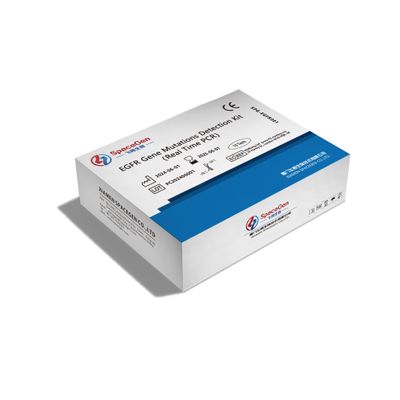

- Home
- Companies
- Xiamen Spacegen Co., Ltd.
- Products
- SPACEGEN - EGFR Gene Mutations ...

SPACEGEN - EGFR Gene Mutations Detection Kit (Mutiplex Fluorescence PCR)
Detection Gene:EGFR (covering exons 18, 19, 20 and 21, total 30 loci related to targeted drugs). Detection Significance:Guide the selection of EGFR-TKIs.EGFR INTRODUCTION
Epidermal growth factor receptor (EGFR), a receptor tyrosine kinase, is expressed in about 50% of patients with non-small cell lung cancer (NSCLC)and is closely related to the occurrence and development of tumors. EGFR is the most frequently mutated driver gene in East Asian NSCLC patients, with a mutation frequency of 38.4%, among which the mutation frequency in East Asian female NSCLC patients is 51.1%. But for Europeans or Americans, 19% of NSCLC patients carry EGFR mutations. EGFR gene mutation is the most important predictor of the efficacy of EGFR kinase inhibitors (TKI) and is a prerequisite for clinical decision of whether a patient can be treated with EGFR-TKI. Both the National Comprehensive Cancer Network (NCCN) include EGFR mutation testing as a Class 1 recommendation.
COMMON MUTATION
EGFR carcinogenic mutations occur mostly on exon 18-21, among which 19 del and L858R account for 85%-90% of all EGFR mutations, and are also the most common EGFR-TKI sensitive mutations. The T790M mutation suggests that the first and second generations of EGFR-TKI are resistant, and the third generation of EGFR-TKI needs to be used. 20 ins mutations are insensitive to conventional EGFR-TKI, suggesting the use of EGFR 20 ins inhibitors.
Core Technology:PAP-ARMS®
Applicable Disease:Non-small cell lung cancer
Instruments Validated:ABI7500, ABI7300, ABI StepOne Plus, LightCycler480, Bio-Rad CFX96, etc.
Sample Type:Tumor tissue,Peripheral blood,Pleural effusion &Ascites
Qualification:ISO13485 certificate, CAP,CE marking
Pack Size:10 Tests/Kit
1.EGFR mutation detection in patients with operable stage IB-IIIA NSCLC to guide adjuvant targeted therapy.
2.EGFR gene mutation testing is performed for patients with inoperable stage III and IV NSCLC before first-line treatment, and treatment is guided by molecular classification.
3.In patients with EGFR-TKI resistance, biopsy is recommended for EGFR gene mutation detection.
1.High Accuracy: Closed tube testing is adopted to effectively avoid cross contamination.
2.High Sensitivity: EGFR gene mutations as low as 1% in 10ng DNA samples can be detected.
3.Comprehensive Detection:This panel comprehensively targets all druggable mutations within exons 18-21 of the EGFR gene, encompassing sensitive driver mutations (e.g., L858R, Del19), acquired resistance variants (T790M), and exon 20 insertion alterations..
